, 0°
Wind: mph
MONTICELLO, NY — The horsewomen of Monticello Raceway are making their mark at the “Mighty M,” not only as grooms taking care of the Standardbreds racing on the local harness track, …
Stay informed about your community and support local independent journalism.
Subscribe to The River Reporter today. click here
This item is available in full to subscribers.
Please log in to continue |

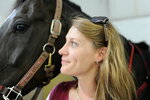
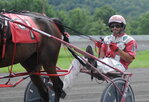
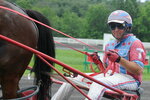


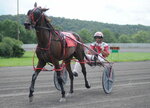
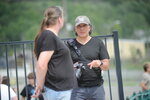
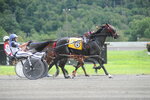
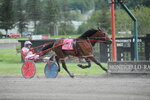
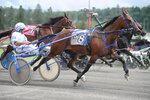


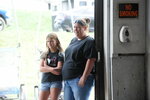
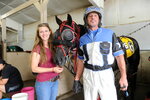

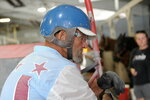
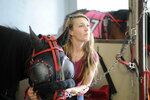
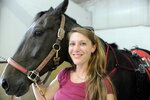
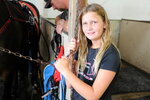

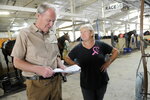
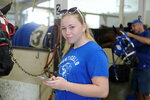
MONTICELLO, NY — The horsewomen of Monticello Raceway are making their mark at the “Mighty M,” not only as grooms taking care of the Standardbreds racing on the local harness track, but as breeders, trainers and drivers.
Several years ago, Australian driver Kerryn Manning was hailed as the world’s best female driver. Andrew Kelly, chief executive of Harness Racing Australia, called her a trailblazer in the wake of the then 21-year-old posting a win at Norway’s Harley Davidson Trot in 1997.
A bit closer in time and location, fellow Aussie Lauren Tritton is recognized as one of the few women in the mostly male-dominated sport in the United States. She competes several nights a week at Yonkers Raceway, earning repeated jaunts to the winner’s circle.
The horsewomen at Monticello are still a rather rare breed, but are making their presence known. They’re posting wins in the record books, either by training or piloting their horses atop spidery two-wheeled gigs to the coveted winner’s circle before the once-mighty grandstands overlooking the track.
Betsy Phillips, a veteran horsewoman whom Shawn Wiles, Monticello’s director of racing and facilities, described as “a pioneer” in the sport, put in a lot of time on a bike back in the 1990s and 2000s. She set track records at the Mighty M, Pocono Downs and Yonkers Raceway, all during 10 days of intense racing action with her three-year-old colt pacer Assault Weapon in the late ‘90s.
On the matter of women in the sport, Wiles said that overall “female horsemen are more patient, calmer and show more care, and are more attentive to the horses health and well-being,” than their male counterparts in the sport.
“They love their horses, as some become part of their family. They will hold onto them after their racing career is concluded, and keep them to ensure that they live the remainder of their lives properly cared for, instead of the usual route for aged horses when they are done racing, where they will get sold to the Amish, or worse, the slaughterhouse.”
Phillips has been in the business since the age of 16, picking up the reins from her father, Pete Sieniekwicz, who owned Sea Horse Farm in Goshen, and later took a BOCES “horse course” at the Goshen Historic Track.
Over the years, she has given up her seat in a sulky to devote time to breeding and training, operating Phillips Stables at the Mighty M.
“I’ve been here a long time,” Philips said, reflecting on her time at Monticello. She added that one of her trotters, Get the Flock Out, “was one of the best trotters out here; she’d win, win, win—a real good horse.” And there was Ampong, “a mare that had 10 foals for me, every one an open-trotter stake winner.”
Many of the old-timers knew her, she said of Ampong. “I was on vacation and bought her at a sale for $275. I wasn’t going to buy a horse, but they walked her in and there was just something about her, and you know what, I’m going to buy her… She turned out to be a really nice horse. Once in a while, you get lucky.”
Today, Phillips owns a trio of horses—Martz Creek Luck, Whoopsaduezy and Voula—and on August 17, noted driver Bruce Aldrich Jr. was on the bike behind Martz Creek Luck.
“He’s a good driver; he’s smart with a good set of hands. Light hands are major for a good driver,” she said. “You don’t want drivers with heavy hands that just lay there in their mouths; you want a light, feathery kind of driver.”
Asked how the sport has evolved in her 48 years in harness racing, Phillips responded, “It’s different now than when I first started. It was easier to make money, but now you have to have the right class of horse to make money. Years ago, a cheap horse could make money.”
On the future of Monticello Raceway, she said, “I think it will keep going forever. A lot of people grew up here; it’s like a home track.
“I love being around horses, I like action, and I can’t sit idle,” said the 66-year old veteran reinswoman.
Nicole Regina, 35, grew up around horses given that her folks Dawn and Kenny DeVaux are well-known names in the sport, and she is the niece of Jimmy DeVaux, a noted driver at Monticello.
She explained that when her parents moved to the Sunshine State to race horses, she returned to this area, “fell in love with Standardbreds, and never got out of it.
“Monticello is such an amazing place; it really is,” said Regina. “You come in, do your work and go home… you don’t have to do night racing, you get to do something you absolutely love… I like sitting on the sidelines giving orders.”
On the topic of the future of harness racing, she said, “It’s tough; whenever we get publicity, it’s usually bad… Whenever bad things happen, that makes the news, I hope it doesn’t die.”
It’s a great business, she said. “It teaches you to appreciate the little things in life, like having an animal love you back… Once it gets in your blood, you can’t get rid of it.”
All the horses want “is love ‘em, feed ‘em and take care of ‘em,” said Regina. “They don’t care what you look like, or if you have makeup on; they just want unconditional loving.”
Comments
No comments on this item Please log in to comment by clicking here